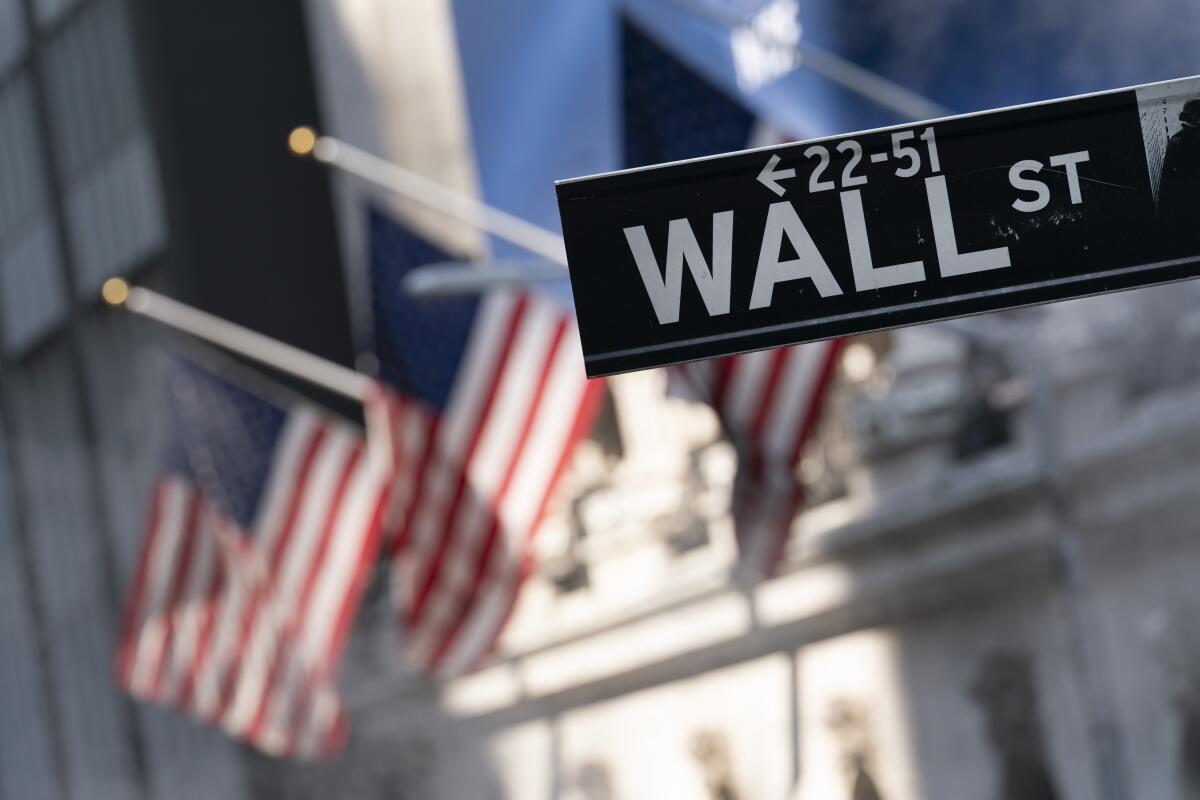Stocks slide as companies begin reporting earnings

- Share via
Stocks shed early gains and ended broadly lower on Wall Street on Tuesday as investors brace for a big week of news on inflation and company earnings.
The Standard & Poor’s 500 index fell 0.9%, extending its losing streak to three days. All of the benchmark index’s 11 company sectors closed in the red.
The Dow Jones industrial average slid 0.6%, and the Nasdaq composite lost 0.9%.
Technology, healthcare and energy stocks accounted for a big share of the S&P 500′s losses. Bond yields mostly fell, as did energy futures.
Clothing company Gap fell 5% after announcing that Chief Executive Sonia Syngal is stepping down from her role after two years on the job.
28-year-old Dominic Green signed out of his shift on a Wednesday afternoon. Five days passed before his body was discovered.
The market pullback follows a rare winning week for stocks and comes as investors focus on corporate earnings reports and what they say about how inflation and rising interest rates are affecting company profits.
“We’ll get more color in the next couple of weeks about how the economy is shaping up, through the lens of companies,” said Terry Sandven, chief equity strategist at U.S. Bank Wealth Management.
The S&P 500 fell 35.63 points to 3,818.80. The Dow dropped 192.51 points to 30,981.33, and the Nasdaq slid 107.87 points to 11,264.73.
Smaller-company stocks held up better than the broader market. The Russell 2000 slipped 3.83 points, or 0.2%, to 1,728.18.
Energy stocks were among the biggest decliners Tuesday as energy prices fell. The price of U.S. crude oil slumped 7.9% to $95.84 a barrel. Hess fell 3.9%.
Technology stocks also lost ground, weighing heavily on the S&P 500. Pricey values for tech stocks tend to push the broader market higher or lower. Microsoft fell 4.1%.
Several travel-related companies bucked the market decline. United Airlines climbed 8.1%, American Airlines jumped 10% and cruise line operator Carnival rose 7.5%.
Investors remain worried about the possibility the economy will tip into a recession as the Federal Reserve jacks up interest rates to tackle the highest inflation in four decades. Higher interest rates can squelch inflation but also can choke economic growth and weigh on all kinds of investments.
Against this backdrop, big companies are set to report their latest quarterly results over the next few weeks. Expectations for second-quarter results appear subdued. Analysts are forecasting 5.1% growth for companies across the S&P 500, which would be the weakest since the end of 2020, according to FactSet.
Soft drink and snack maker PepsiCo slipped 0.6% on Tuesday after releasing a profit report that easily beat analysts’ estimates.
Delta Air Lines will report its latest results Wednesday and provide more insight into the travel industry’s recovery from the pandemic. Major banks, including JPMorgan Chase and Citigroup, are on tap later this week.
The key concerns on Wall Street remain inflation and whether aggressive rate increases from the Federal Reserve will push the economy into a recession. Investors have had to deal with a turbulent market over the last several months because of those concerns. Major indexes have often swung wildly between gains and losses on any given day and remain in a broad slump.
“The multitude of crosscurrents in the marketplace suggest that caution is warranted,” Sandven said.
Inflation jumped as the economy recovered from the pandemic and demand for goods outpaced supplies. It heated up further in February after Russia invaded Ukraine and sparked a jump in energy prices. Supply-chain problems have worsened as China locks down cities in an effort to contain new COVID-19 cases.
The Fed is raising rates in an effort to slow economic growth to help temper the effects of high inflation. But the economy is already slowing down as consumers ease up on spending, and Wall Street is worried that interest rate hikes could go too far and bring on a recession.
In the bond market, a warning signal continued to flash about a possible recession. The yield on the 10-year Treasury slid to 2.96% from 2.98% late Monday. It remains below the two-year Treasury yield, which fell to 3.04%. That’s a rare occurrence, and some investors see it as a sign that a recession may hit in the next year or two.
Wall Street is keeping a close watch on any signs that inflation is easing. The Labor Department will release its June report on consumer prices Wednesday and its June report on prices directly affecting businesses Thursday.
More to Read
Inside the business of entertainment
The Wide Shot brings you news, analysis and insights on everything from streaming wars to production — and what it all means for the future.
You may occasionally receive promotional content from the Los Angeles Times.











